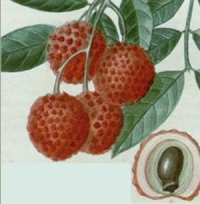June 2019.
Litchis or Lychees are sometimes called the queen of fruits as they are rich in Vitamin C, Minerals like Potassium, Magnesium, and Copper, and also in ‘Flavanoids’ which are effective Antioxidants.*
Litchis are one of the very highly recommended fruits and immensely tasty too!
So, is there any risk in eating them, given there has been a lot of talk in the news recently of children dying of eating Litchis in the northern Litchi orchard belt of India?
There is absolutely no cause for concern….
You just need to understand a little more about this fruit and the scenario of the areas where such news came from.
Circumstances in North Indian Litchi belt….
Picture the scenario in those Indian villages where litchi orchards are abundant, the economic condition of families is very low, and children are undernourished with low reserves of glucose and glycogen (the storage form of glucose in the liver). These children spend the day eating litchis from the orchards (especially those fallen down, as only litchi bunches have commercial value, not single fruits). The children feel full of Litchis and skip their regular meals like lunch and dinner.
Litchis contain substances called Methylene-Cyclo-Propyl-Glycine (MCPG) and Hypoglycin A. These are present in the Litchi seeds (about 1.8 micrograms per gram of MCPG) and are also present in the fruit pulp, more in the unripe pulp (about 0.5 micrograms per grams of MCPG) than in the ripe pulp (about 0.1 micrograms per gram). These substances prevent the conversion of fat (fatty acids) in the liver to glucose. Though Litchis taste sweet, it is because it is high in another sugar called Fructose, and not Glucose which is the sugar that is used by our cells for energy. High fructose helps in keeping blood glucose low.
Therefore, the blood glucose level in these children drops very low especially when they go to bed at night skipping their dinner, being full on Litchis. This is due to the mentioned substances in Litchi preventing adequate blood glucose, in the already undernourished children with poor glucose reserves. This affects the brain, and these children typically wake up in the morning with sudden (acute) symptoms of encephalitis (inflammation of the brain) like high fever, convulsions, disorientation, which can lead to coma and death. This is worsened by added dehydration especially when temperatures and humidity are high.
A major outbreak of AES (Acute Encephalitis Syndrome) in 2014 in the northern litchi belt had been investigated, where the said Litchi substances were found in the urine samples of these children, no infecting agent was identified or isolated, there was a history of these children eating litchis all day and skipping dinner, and all the affected children had a significant fall in blood glucose. On the basis of these findings, this hypothesis of the link between the Litchi and AES was put forward.
Scientists are still investigating the cause of the 2019 Acute Encephalitis Syndrome (AES) outbreak in parts of UP, and Bihar, and the possibilities being put forward range from viral or infectious cause to extreme heat-humidity and prevailing malnutrition. Litchi consumption may have been a trigger in some of the cases, but may not be labeled as the main cause of what appears as an AES epidemic. Though a viral cause spreading through animal (livestock) or contaminated water-food route in these areas causing these AES cases, is being actively investigated for, no infectious agent has been isolated or identified so far.
The risk of developing significant low blood glucose because of eating Litchis is realistic only if you are eating mainly or only Litchis through the day, skipping regular meals, and also are undernourished or been fasting over a period of time.
However here are three important points worth keeping in mind to continue enjoying the summer months with these wonderful fruits without any undue fear of an adverse health impact –
- Always be well hydrated with regular water intake during the hot months.
- Avoid eating Litchis as a substitute for regular meals, and avoid going to bed, after skipping regular dinner due to being full eating Litchis. Enjoy these wonderful fruits along or after any of your meals.
- Avoid Litchis during/after prolonged fasting or on an empty stomach, or when undernourished due to any reason like recovering from an illness which prevented proper food intake (like vomiting, diarrhea, fever, etc).
Take special care of the above points in children
* Antioxidants are substances that defend our body cells from damage caused by harmful molecules called ‘free radicals’ which are released during inflammation and ageing.
———————————————–
For any query, additional information or to discuss any case, write to info@drvarsha.com, and be assured of a response soon.
References
- CURRENT SCIENCE, VOL. 109, NO. 12, 25 DECEMBER 2015
- Lancet Glob Health 2017; 5: e458–66
- Biochem J; 2019 Mar, 475(6): 1063–1074
Also read:


